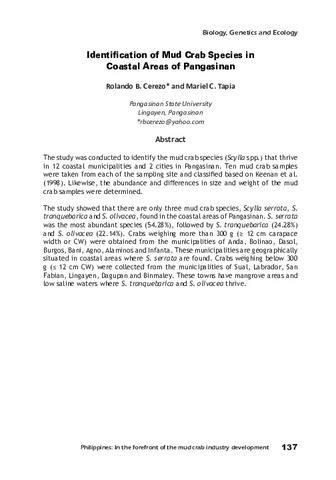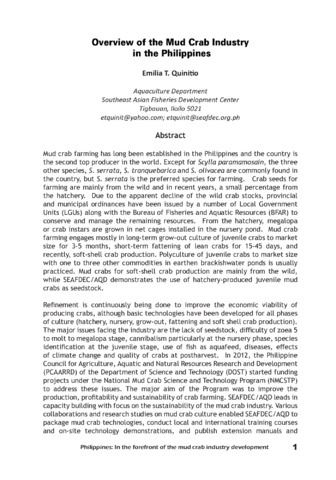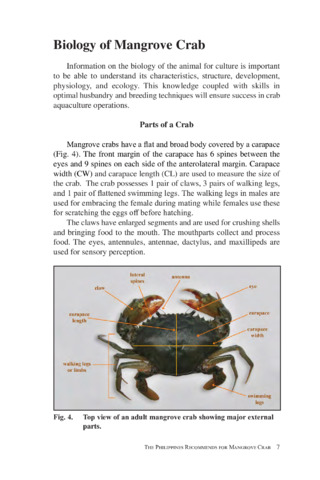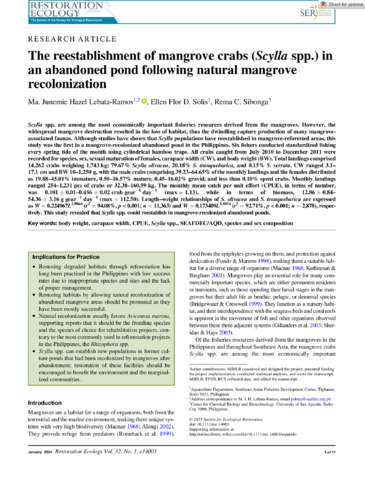Perlihatkan publikasi sederhana
Identification of mud crab species in coastal areas of Pangasinan
| dc.contributor.author | Cerezo, Rolando B. | |
| dc.contributor.author | Tapia, Mariel C. | |
| dc.contributor.editor | Quinitio, Emilia T. | |
| dc.contributor.editor | Parado-Estepa, Fe Dolores | |
| dc.contributor.editor | Coloso, Relicardo M. | |
| dc.date.accessioned | 2017-08-25T08:54:08Z | |
| dc.date.accessioned | 2017-08-25T16:28:34Z | |
| dc.date.available | 2017-08-25T08:54:08Z | |
| dc.date.available | 2017-08-25T16:28:34Z | |
| dc.date.issued | 2017 | |
| dc.identifier.citation | Cerezo, R. B., & Tapia, M. C. (2017). Identification of mud crab species in coastal areas of Pangasinan. In E. T. Quinitio, F. D. Parado-Estepa, & R. M. Coloso (Eds.), Philippines : In the forefront of the mud crab industry development : proceedings of the 1st National Mud Crab Congress, 16-18 November 2015, Iloilo City, Philippines (p. 137). Tigbauan, Iloilo, Philippines: Aquaculture Department, Southeast Asian Fisheries Development Center. | en |
| dc.identifier.isbn | 9789719931072 | |
| dc.identifier.uri | http://hdl.handle.net/10862/3171 | |
| dc.description | Abstract only. | en |
| dc.description.abstract | The study was conducted to identify the mud crab species (Scylla spp.) that thrive in 12 coastal municipalities and 2 cities in Pangasinan. Ten mud crab samples were taken from each of the sampling site and classified based on Keenan et al. (1998). Likewise, the abundance and differences in size and weight of the mud crab samples were determined. The study showed that there are only three mud crab species, Scylla serrata, S. tranquebarica and S. olivacea, found in the coastal areas of Pangasinan. S. serrata was the most abundant species (54.28%), followed by S. tranquebarica (24.28%) and S. olivacea (22.14%). Crabs weighing more than 300 g (~.12 cm carapace width or CW) were obtained from the municipalities of Anda, Bolinao, Dasol, Burgos, Bani, Agno, Alaminos and Infanta. These municipalities are geographically situated in coastal areas where S. serrata are found. Crabs weighing below 300 g (~.12 cm CW) were collected from the municipalities of Sual, Labrador, San Fabian, Lingayen, Dagupan and Binmaley. These towns have mangrove areas and low saline waters where S. tranquebarica and S. olivacea thrive. | en |
| dc.language.iso | en | en |
| dc.publisher | Aquaculture Department, Southeast Asian Fisheries Development Center | en |
| dc.subject | Scylla olivacea | en |
| dc.subject | Scylla serrata | en |
| dc.subject | Scylla tranquebarica | en |
| dc.subject | Philippines | en |
| dc.title | Identification of mud crab species in coastal areas of Pangasinan | en |
| dc.type | Conference paper | en |
| dc.citation.spage | 137 | |
| dc.citation.conferenceTitle | Philippines : In the forefront of the mud crab industry development : proceedings of the 1st National Mud Crab Congress, 16-18 November 2015, Iloilo City, Philippines | en |
| dc.subject.asfa | abundance | en |
| dc.subject.asfa | dominant species | en |
| dc.subject.asfa | identification | en |
| dc.subject.asfa | length-weight relationships | en |
| dc.subject.asfa | mangrove swamps | en |
| dc.subject.asfa | marine crustaceans | en |
| dc.subject.asfa | resource management | en |
| dc.subject.asfa | species diversity | en |
| dc.subject.asfa | stock assessment | en |
| dc.subject.asfa | stocks | en |
| dc.subject.scientificName | Scylla serrata | en |
Files in this item
Publikasi ini ada di koleksi berikut
-
Philippines : In the forefront of the mud crab industry development [44]
Proceedings of the 1st National Mud Crab Congress






